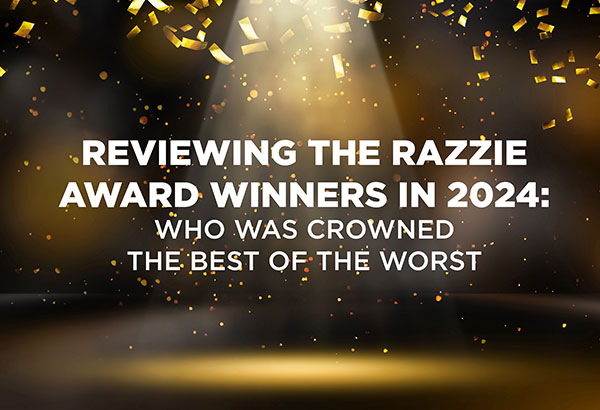In the glitzy world of Hollywood, where red carpets and accolades abound, there exists a unique and somewhat infamous event that celebrates the less-than-stellar achievements in cinema: The Razzie Awards. As we delve into the aftermath of the 2024 Razzie Awards, we embark on a journey through the highs and lows of cinematic missteps, exploring the significance of this tongue-in-cheek ceremony and dissecting the winners of its most coveted (or perhaps dreaded) categories.
The Razzie Awards: A Brief History
Dating back to 1981, the Golden Raspberry (Razzie) Awards have carved out their own niche in the landscape of film awards, offering a counterpoint to the glitz and glamour of events like the Oscars. Originating as a playful jab at Hollywood's less-than-stellar offerings, the Razzies have evolved into a satirical celebration of cinematic blunders, honouring the best of the worst performances and productions each year. Over the decades, the awards have seen their fair share of memorable winners, from cringe-worthy performances to outright cinematic disasters.
All You Need To Know About The Razzie Awards
But what exactly are the Razzie Awards, and why do they hold such a peculiar place in the film industry? Here’s all you may want to know:
How are the winners of Razzie Awards determined?
The process of determining Razzie Award winners is a departure from the more conventional methods seen in traditional awards shows. Rather than relying on industry insiders or elite panels of judges, the Razzies adopt a distinctly democratic approach.
Inclusion of Diverse Perspectives in the Razzies
Winners are chosen by a voting body that reflects a wide spectrum of viewpoints within the film community. This body comprises film enthusiasts, critics, and industry insiders, ensuring that various perspectives are taken into account. By including individuals with different backgrounds and areas of expertise, the Razzies aim to provide a comprehensive assessment of the year's cinematic missteps.
Democratic Voting Process of the Razzies
The voting process itself is democratic in nature, with each member of the voting body afforded the opportunity to cast their ballot. This democratic ethos means that no single entity holds undue influence over the outcome, and every vote carries equal weight. As a result, the Razzies embrace an element of unpredictability, often leading to unexpected winners and surprising outcomes.
Unconventional Criteria of the Razzies
Unlike traditional awards shows that celebrate excellence and achievement in filmmaking, the Razzies prioritize recognizing the "worst" in film. This means that nominees and winners are selected based on criteria such as poor acting, lacklustre directing, and subpar production values. While this approach may diverge from more conventional standards of cinematic merit, it allows the Razzies to shine a spotlight on aspects of filmmaking that are often overlooked or dismissed.
How the Razzie Awards are Provoking Conversation and Debate
The democratic nature of the Razzies' voting process fosters dialogue and debate within the film community. By inviting participation from a diverse array of individuals with varying tastes and perspectives, the Razzies encourage discourse around the merits and shortcomings of the year's cinematic offerings. This exchange of ideas contributes to a broader understanding of film as an art form and stimulates critical engagement with the medium.
The Controversy Surrounding the Razzies
While some view the Razzies as a light-hearted critique of Hollywood excess, others criticize the awards for their perceived negativity and lack of constructive criticism. Critics argue that the Razzies often target low-hanging fruit, unfairly singling out films or individuals for ridicule without offering meaningful insight or analysis. Additionally, there are concerns that the Razzies may contribute to a culture of cynicism within the film industry, overshadowing genuine efforts and artistic endeavours.
The Impact of the Razzies
Despite the controversy surrounding them, the Razzies continue to provoke conversation and debate within the film community. For some, the Razzies offer a refreshing alternative perspective on the often-glamourised world of cinema, reminding audiences that even the most revered filmmakers and actors are not immune to failure. Others see the Razzies as a necessary reminder of the importance of critical discourse and accountability in the arts, challenging filmmakers to strive for excellence and innovation in their craft.
The 2024 Razzie Award Winners
Now, let's turn our attention to the crème de la crème of cinematic misfires: the winners of the 2024 Razzie Awards. In categories ranging from Worst Picture to Worst Actor and Actress, the recipients of these dubious honours have left an indelible mark on the annals of cinematic history. From lacklustre performances to ill-conceived plots, each winner offers a glimpse into the pitfalls of filmmaking.
Worst Picture: Winnie-the-Pooh: Blood and Honey
Taking the top spot for Worst Picture is "Winnie-the-Pooh: Blood and Honey," a film that simply ‘butchers’ the whimsy and charm of its beloved source material, and not in the way that was intended for a horror spin. Directed by Rhys Frake-Waterfield, this misguided adaptation left audiences scratching their heads and wondering why anyone thought it was a good idea to tarnish the legacy of Winnie-the-Pooh in such a manner.
Worst Director: Rhys Frake-Waterfield – Winnie-the-Pooh: Blood and Honey
In the category of Worst Director, Rhys Frake-Waterfield earns the dubious distinction for his work on "Winnie-the-Pooh: Blood and Honey." Despite his best intentions to perhaps revive the property with a tongue-in-cheek horror take, Frake-Waterfield's direction and the silly concept - not to mention abysmal effects and acting - left audiences bewildered and disappointed.
Worst Actor: Jon Voight – Mercy as Patrick Quinn
Jon Voight's performance in "Mercy" as Patrick Quinn earns him the title of Worst Actor. Despite his storied career and past accolades, Voight's portrayal failed to resonate with audiences, delivering a lacklustre performance that fell flat in a sea of mediocrity.
Worst Actress: Megan Fox – Johnny & Clyde as Alana Hart
Megan Fox takes home the award for Worst Actress for her role as Alana Hart in “Johnny & Clyde.” Despite her efforts to breathe life into the character, Fox’s performance failed to impress, leaving critics and audiences underwhelmed by her portrayal of the femme fatale.
Biggest Surprises at the 2024 Razzie Awards
Among the biggest surprises of the evening were the dishonours bestowed upon two highly anticipated films. "Ant-Man and The Wasp: Quantumania" took home a nomination for the title of Worst Sequel, disappointing fans who had hoped for a worthy follow-up to its predecessors. Meanwhile, "Indiana Jones and the Dial of Destiny" claimed a nomination for Worst Screenplay, shocking audiences with its lacklustre dialogue and uninspired plot twists – nowhere near good enough for a franchise of such acclaim and repute. In their respective categories both of these films lost to - you guessed it - "Winnie-the-Pooh: Blood and Honey."
The 2024 Razzie Awards offer a glimpse into the creative underbelly of Hollywood, shining a light on the less-than-perfect aspects of filmmaking. While the ‘winners’ may not have walked away with a particularly coveted award, their contributions to cinematic history are nonetheless worthy of acknowledgment – they have a place in the world of moviemaking, even if it’s just to showcase what not to do.
Do you have a Razzie list of your own? Tell us about it – join the conversation.

